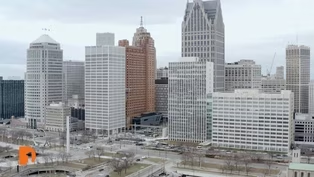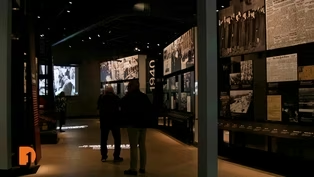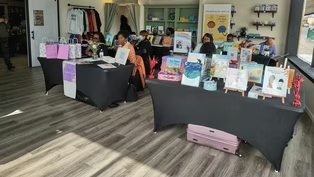
Tapping into Detroit’s techno roots w/producer Carl Craig
Clip: Season 8 Episode 33 | 5m 25sVideo has Closed Captions
Trailblazing Detroit-born techno producer Carl Craig on the Black music experience.
You can’t talk about Detroit’s African American techno roots without talking about pioneering producer Carl Craig. For Black History Month, host Stephen Henderson talks with Craig, a leading figure in the second wave of Detroit techno, about the creation of the genre. Plus, they talk about the importance and influence of the Black music experience locally and globally.
Problems playing video? | Closed Captioning Feedback
Problems playing video? | Closed Captioning Feedback
One Detroit is a local public television program presented by Detroit PBS

Tapping into Detroit’s techno roots w/producer Carl Craig
Clip: Season 8 Episode 33 | 5m 25sVideo has Closed Captions
You can’t talk about Detroit’s African American techno roots without talking about pioneering producer Carl Craig. For Black History Month, host Stephen Henderson talks with Craig, a leading figure in the second wave of Detroit techno, about the creation of the genre. Plus, they talk about the importance and influence of the Black music experience locally and globally.
Problems playing video? | Closed Captioning Feedback
How to Watch One Detroit
One Detroit is available to stream on pbs.org and the free PBS App, available on iPhone, Apple TV, Android TV, Android smartphones, Amazon Fire TV, Amazon Fire Tablet, Roku, Samsung Smart TV, and Vizio.
Providing Support for PBS.org
Learn Moreabout PBS online sponsorship- I grew up here in the '70s and the '80s, just like you did.
And I remember so poignantly when you and Derrick May and Kevin were making all of this new noise, right, is what my mom called it when she first heard it.
And I think even then it was really obvious that you guys were changing music in a really fundamental way, changing the way we think about it, changing the way we move to it, changing the way it influences our lives.
So let's go back to that time and talk about where this comes from and how you guys came up with the sound and the drive that is hip hop and rap and all of the things that come out of it.
- Yeah, Detroit techno started with Juan Atkins and Rik Davis, Cybotron.
That was the beginning.
And by the time I came around, my cousin had done technicolor with Juan and I would play basketball in the backyard listening to Kevin and Derrick's music and listening to Jeff Mills on the radio as a wizard.
So by the time I got in, it was already primed, and well-oiled early baby machine.
(both laughing) So when I had the opportunity to meet Derrick, I thought he was Big Brother Almighty when I first met him and went down to the music institute and partied down there with just this multicultural crowd of people that were coming down, people that I knew from when I went to Cass, people that I knew when I went to Cooley, people that I was meeting when I was going down to the shelter at St. Andrew's Hall, that club.
So I was seeing these amazing things that were happening on a multicultural level that was way different than anything that I had experienced before.
So I was happy, happy, happy to be a part of it, and I knew that it had to be my destiny.
- Yeah.
Talk the importance of this being Black music.
- Man, it is crazy important.
Now we have a lot of influence that comes, of course from craft work and- - Germans.
- Early '80s synth pop because we are using synthesizers and drum machines.
Someone that had said something that was real funny to me when they read an article of what Ike Turner's favorite record was, which was "Rumors" from Fleetwood Mac, it was like, what the heck is this?
And I think this is what people think about Detroit Techno is when we talk about craft work as an influence, then they get kind of confused and they want to just hijack the whole thing and say that we're only influenced by this white music.
But no, we're influenced by George Clinton, we're influenced by James Brown, we're influenced by Prince, we're influenced by Stevie Wonder, and the electronic stuff that came out through Motown, so we're heavily influenced from Black music and as Black artists that are from essentially the hood, (both laughing) we're making music that had as much roots to urban culture as rap music, gangster rap as any other form of, we're celebrating hip hop 50 or celebrated hip hop 50.
And you know, the thing about hip hop that has been able to be so strong over the years is because it really delved into its urban and many times its underworld culture.
In order to get people to be interested and stay interested in the story, like watching "Scarface" or watching any type of gangster movie.
But with Detroit techno, we didn't, we purposely didn't try to make it into some sort of gangster music because we're not gangsters.
So it's the other side, we're not nerds either.
But it's something that people would see more on a nerdy side, they would see us more like the "Big Bang Theory" maybe than they would see us as "In Living Color."
- Yeah.
Yeah.
Detroiters asked to weigh in on new election district maps
Video has Closed Captions
Clip: S8 Ep33 | 7m 17s | Detroit residents being asked to weigh in on seven new election maps at public hearings. (7m 17s)
Holocaust Center’s revamped exhibit tells survivor stories
Video has Closed Captions
Clip: S8 Ep33 | 7m 43s | Zekelman Holocaust Center re-opens newly renovated exhibit highlighting survivor stories. (7m 43s)
One Detroit Weekend: February 16, 2024
Video has Closed Captions
Clip: S8 Ep33 | 1m 58s | Ways to celebrate Black History Month in and around Detroit throughout February. (1m 58s)
Providing Support for PBS.org
Learn Moreabout PBS online sponsorship
- News and Public Affairs

Top journalists deliver compelling original analysis of the hour's headlines.

- News and Public Affairs

FRONTLINE is investigative journalism that questions, explains and changes our world.












Support for PBS provided by:
One Detroit is a local public television program presented by Detroit PBS


